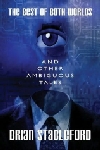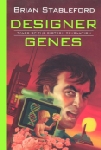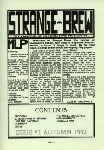Review by Ian Braidwood
One of Brian's most stylish stories and one he had a lot of fun with,
as will become clear.
Somebody out there has gone on a killing spree and unfortunately, he's
a bit of a clever clogs. In fact, not since Iago has a smart-arse led
the forces of truth and righteousness such a merry dance; and he had
Shakespeare to help him.
Weighing-in for the law is Hal Watson, abetted by Charlotte Holmes.
Notice that the verb in the second phrase of the last sentence is lacking
its usual adjective; a clue to the type of tale we're dealing with.
Having decided that the Police aren't smart enough to appreciate the
full poetic beauty of his crimes, the miscreant decides to rope in Oscar
Wilde, genetic flower designer and professional dandy.
With Watson scanning the web for clues, Holmes and Wilde follow smart-arse's
itinerary; trying to prevent more deaths and figuring out the who and
the why.
All this leads up to a sensational denouement, which would stretch
the talents of any artist.
In summary: SE7EN for laughs.






















